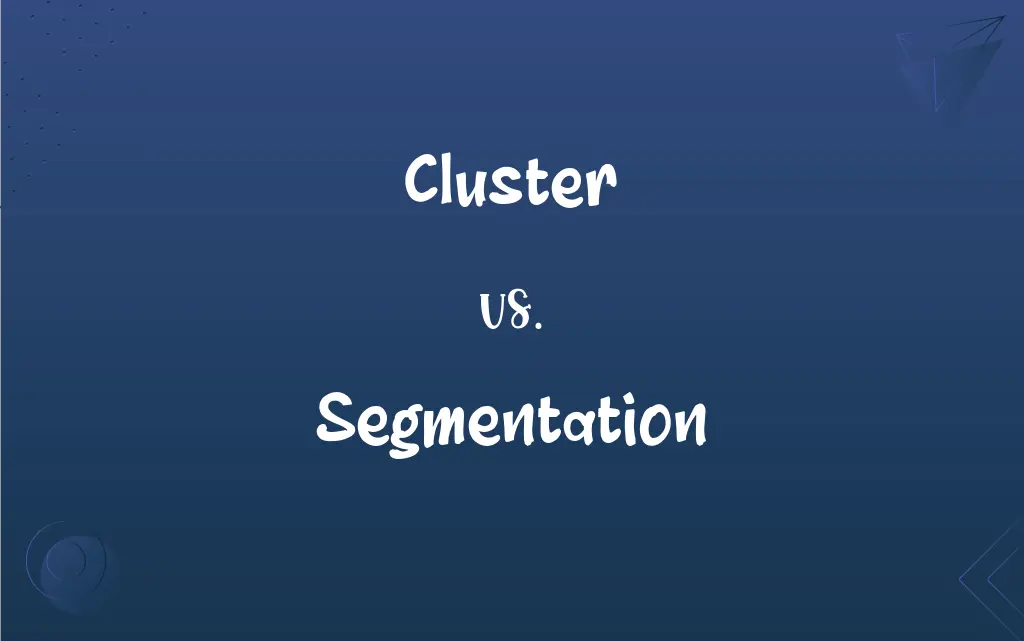Cluster vs. Segmentation: What's the Difference?
Edited by Janet White || By Harlon Moss || Updated on November 7, 2023
A cluster is a group of similar items or occurrences close together, while segmentation is the process of dividing into separate parts or sections.

Key Differences
Clusters refer to a collection of similar things or people situated or occurring closely together. Segmentation, in contrast, is the act of dividing something into separate parts or sections, which might be based on shared characteristics or for analysis.
In the context of data analysis, a cluster is a set of data points that naturally group together because of certain similarities. Segmentation, however, refers to the process of intentionally dividing data into segments based on predefined criteria, such as customer behavior or demographic profiles.
A cluster is often used to describe naturally occurring groupings, like stars in a galaxy or a cluster of flowers. Segmentation is a deliberate process, such as segmenting a market into different target audiences or segmenting an orange into individual pieces.
Clusters can emerge without any deliberate action, as a result of patterns or tendencies found within a dataset or physical space. Segmentation is always a deliberate act, often used to simplify, organize, or tailor approaches, like segmenting a network for security purposes.
In computing, a cluster can refer to a group of servers working together, while segmentation can refer to the division of a computer's memory into segments for efficient management and access.
ADVERTISEMENT
Comparison Chart
Definition
A group or collection of similar items.
The process of dividing into segments.
Occurrence
Natural or self-organizing.
Deliberate and methodical.
Purpose
To identify natural groupings.
To create distinct sections for analysis.
Example in Nature
A cluster of stars.
Segmentation of insect body parts.
Example in Business
A cluster of businesses in a district.
Market segmentation based on consumer behavior.
ADVERTISEMENT
Cluster and Segmentation Definitions
Cluster
A collection of related things.
He studied the cluster of symptoms in the patient's diagnosis.
Segmentation
The process of dividing into parts.
Market segmentation helps companies tailor their products to specific groups.
Cluster
A group of similar objects or people.
She noticed a cluster of fans waiting outside the theater.
Segmentation
In biology, division into separate segments.
The segmentation of the worm into distinct parts allows it to move fluidly.
Cluster
A number of similar events that occur together.
There was a cluster of earthquakes in the region last month.
Segmentation
In technology, dividing data or resources.
Memory segmentation in the software allows for better performance.
Cluster
A closely packed group.
A cluster of galaxies can contain thousands of individual galaxies.
Segmentation
In marketing, categorizing potential customers.
Effective segmentation can lead to highly targeted advertising campaigns.
Cluster
In computing, a group of servers or data centers.
The data was processed quickly thanks to the new server cluster.
Segmentation
Dividing something into different sections.
The project's segmentation into phases made it more manageable.
Cluster
A group of the same or similar elements gathered or occurring closely together; a bunch
"She held out her hand, a small tight cluster of fingers" (Anne Tyler).
Segmentation
Division into segments.
Cluster
(Linguistics) Two or more successive consonants in a word, as cl and st in the word cluster.
Segmentation
(Embryology) See cleavage.
FAQs
What is segmentation?
Segmentation is the act of dividing something into separate parts for detailed analysis.
What does a cluster represent?
A cluster represents a grouping of similar or related items or events.
Are clusters only found in nature?
No, clusters can occur in various contexts, including data, astronomy, and business.
Is segmentation always deliberate?
Yes, segmentation is a conscious decision to divide something into parts.
What is a business cluster?
It's a geographic concentration of interconnected businesses or industries.
How does segmentation relate to demographics?
Demographics are often used to define segments within a market.
Can clusters be planned?
Clusters can be both natural formations or the result of planning.
Why is segmentation used in marketing?
It's used to target specific customer groups more effectively.
Can cluster analysis be part of segmentation?
Yes, cluster analysis can identify natural groupings that inform segmentation strategies.
Can segmentation be based on behavior?
Yes, especially in marketing, behavior is a common basis for segmentation.
Is segmentation important in online advertising?
Extremely, as it allows for highly personalized and effective advertising.
How does segmentation benefit businesses?
It allows businesses to focus resources on the most profitable market niches.
Are clusters static?
Clusters can be both static and dynamic, depending on the context.
What is a cluster bomb?
It's a weapon that releases several smaller submunitions.
What's the difference between clustering and segmentation in data analysis?
Clustering is finding natural groupings, while segmentation is dividing data based on predefined criteria.
Can clustering lead to segmentation?
Yes, the insights from clustering can inform the criteria for segmentation.
Does segmentation apply to social sciences?
Yes, social scientists use segmentation to study different groups within populations.
Can clustering be subjective?
While it's based on data, the interpretation of clusters can have subjective elements.
Is segmentation used in computers?
Yes, computers use segmentation for organizing memory and data.
Are there tools for cluster analysis?
Yes, there are many statistical tools and software for performing cluster analysis.
About Author
Written by
Harlon MossHarlon is a seasoned quality moderator and accomplished content writer for Difference Wiki. An alumnus of the prestigious University of California, he earned his degree in Computer Science. Leveraging his academic background, Harlon brings a meticulous and informed perspective to his work, ensuring content accuracy and excellence.
Edited by
Janet WhiteJanet White has been an esteemed writer and blogger for Difference Wiki. Holding a Master's degree in Science and Medical Journalism from the prestigious Boston University, she has consistently demonstrated her expertise and passion for her field. When she's not immersed in her work, Janet relishes her time exercising, delving into a good book, and cherishing moments with friends and family.































































